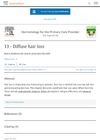Supplement Use Among Women Experiencing Hair Loss
February 2020
in “
International journal of women’s dermatology
”

TLDR Most women with hair loss take more supplements than average, but these often don't help and can be risky and costly.
A retrospective analysis at an academic alopecia clinic revealed that 81% of female patients with hair loss reported using dietary supplements, which is higher than the national average, especially among those aged 18-39 years (63% compared to the U.S. average of 40%). These patients often consumed a higher number of total supplements (4.5) than the overall study population (2.5), with many taking hair-specific supplements like "Hair/Skin/Nails" or biotin. Despite the common perception that supplements are harmless, there are risks associated with their use, including the presence of inadequate active ingredients, contaminants, and the potential for interference with diagnostic lab tests, such as those for thyroid stimulating hormones and troponins. The paper emphasizes that most randomized clinical trials do not show benefits of vitamin and mineral supplements for hair growth, and supplementation is generally only recommended for specific high-risk groups. The cost of these supplements can also be significant, with annual expenses exceeding $1000 for multiple products. The authors suggest that physicians should educate patients about these issues to prevent unnecessary medical expenses and provide realistic expectations, given the lack of effective hair loss treatments for women and the limited regulatory oversight of supplements.





